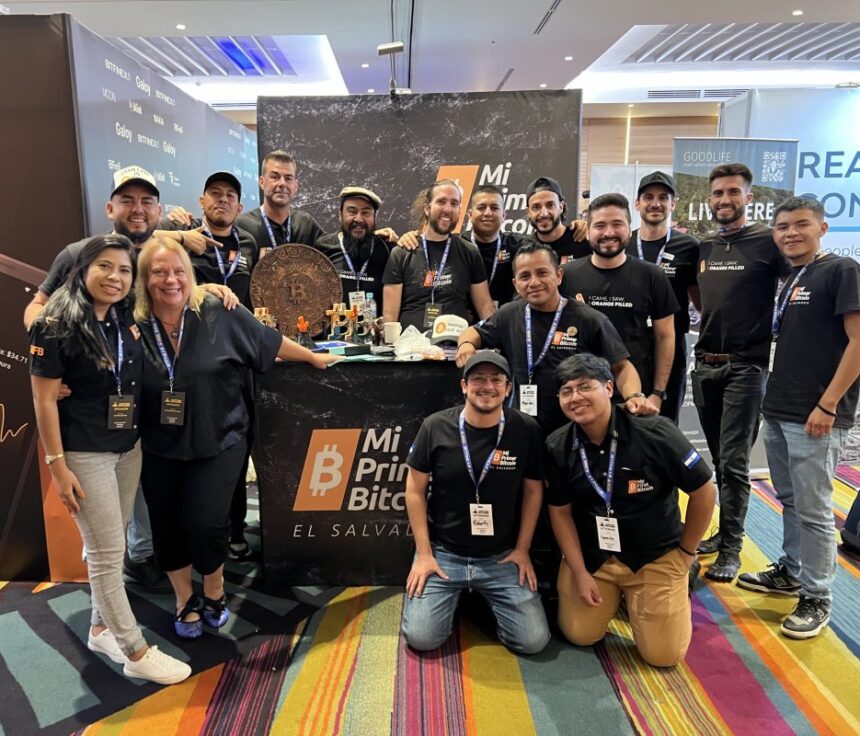Company Name: Mi Primer Bitcoin
Founder: John Dennehy
Established date: August 2021
Headquarters: El Salvador
Amount of Bitcoin held by the Treasury: About 0.5 BTC
Number of employees: twenty one
Website: https://miprimerbitcoin.io/
Public or private? Private (non-profit)
John Dennehy is change the world And he believes Bitcoin education is one way to achieve this.
Denny sees Bitcoin as a tool to help individuals regain control over their lives, and understands that education is essential to enabling people to use this tool.
So in late 2021, he launched a Bitcoin education platform. Mi Primer Bitcoin As a means to empower ordinary Salvadorans.
He believes that for the Bitcoin revolution to truly succeed, Bitcoin users need to thoroughly understand the technology they are involved with.
“Education will naturally resist any attempt to hijack the revolutionary spirit of Bitcoin,” Dennehy told Bitcoin Magazine.
While Denny doesn’t hesitate to call Bitcoin’s widespread adoption nothing short of revolutionary, it’s important to keep in mind that his approach is closer to Ghandi than Guevara’s.
Dennehy is soft-spoken, introspective and kind-hearted, and particularly thoughtful in his approach.

Mi Primer Bitcoin inspiration
Like many people during the COVID-19 lockdown in early 2021, Dennehy was concerned about how helpless people were feeling and wanted to do something about it.
“Being in New York during the pandemic, I spent a lot of time taking long walks thinking about the state of the world and where society was headed,” Dennehy said.
“My conclusion is that the root of the problem is that we have collectively lost our agency and our sovereignty — individuals have lost agency over their own lives — and that has had a lot of negative second and third order effects,” he added.
“The solution was Bitcoin education. The solution was to get more people into Bitcoin and do it in a way that empowers and encourages people to think for themselves, to think critically, and to take control of their own lives and their own futures.”
Riding a wave of inspiration, Dennehy booked a flight to Ecuador, his former country of residence and one that, in his words, was “underserved by the current system,” to begin his Bitcoin education mission.
First attempt
Dennehy arrived in Ecuador in June 2021, where he tried to teach his friends about Bitcoin but struggled to meet people in person due to the pandemic. Without the ability to meet in person, he found it difficult to connect with people.
“Wrong place, wrong time,” Dennehy said of his experience in Ecuador.
However, during his time in Ecuador, Dennehy met with Salvadoran President Najib Bukele announcement Bitcoin is set to become legal tender in El Salvador.
Dennehy was in disbelief and booked the next flight, a one-way ticket to El Salvador, to help make history for the country.
“I sold everything I owned, got a one-way ticket to El Salvador, and decided to see what I could do to help make El Salvador a success,” Dennehy recalled. “As the first country in the world to adopt Bitcoin as legal tender, El Salvador would be an example to the world, for better or worse, and I thought it was most important that El Salvador be a good example.”
Humble Beginnings
Dennehy landed in El Salvador and immediately started selling Mi Primer Bitcoin. Mission Statement I also created some lesson plans and started recruiting both students and teachers.
“The strategy was to tell every Salvadoran I met about Bitcoin — the Uber driver, the waitress at a restaurant, the person next to me while waiting to cross the street,” Dennehy said.
“I had a few random groups of people meet up before the first class, and they came to my Airbnb and we had a group discussion about[Bitcoin],” he recalled.
“From that group, several people will volunteer for the project.”
Despite his years of experience as an ESL teacher and cycling instructor, Dennehy knew from the start that he wasn’t the right person to teach the program he was creating. Instead, he wanted local people to take on that role.
“From the beginning, one of the founding concepts was that it should be community-driven, meaning teachers should be able to engage with students in ways that I never could,” Denney explained, “so it’s a strict rule that all teachers in El Salvador must be Salvadoran.”
The first class was held in a yoga studio between classes and was attended by just one student, but by the end of the first month, a total of five people were attending classes held in the same yoga studio, cafe, and restaurant.
Development of Mi Primer Bitcoin’s “Bitcoin Diploma” program
By February 2022, Denny and the Mi Primer Bitcoin growth team will begin building a proper curriculum and “Bitcoin Diploma” program.
“We got through 2022 with three versions of (the program),” Dennehy said.
“We were iterating very quickly. We didn’t start building until February and the third version was finished in September,” he added.
Denny also said feedback from students about what worked and what didn’t worked well helped the process greatly.
Speaking with Dennehy, I got the impression that building a curriculum wasn’t one of the biggest challenges the organization faced.

Challenges in running Mi Primer Bitcoin
A persistent challenge that Mi Primer Bitcoin has faced since its inception has been establishing the independence and impartiality of a non-profit organization.
Denny discussed how many Salvadorans associate Bitcoin with the Salvadoran government, about which many in the country have polarized feelings.
“From the beginning, there has been a strong connection between the government and Bitcoin in El Salvador,” Dennehy said.
“People who liked the government tended to like Bitcoin and people who didn’t like the government tended to dislike Bitcoin. Some even thought Najib Bukele invented Bitcoin. That was the general perception in the early days,” he added.
“So Bitcoin has strong ties to governments. The struggle at the beginning was showing people that Bitcoin is separate from governments. Bitcoin is independent. So are we.”
Denny noted that this challenge remains as Mi Primer Bitcoin is currently functioning within El Salvador’s public school system.
“We are always trying to assert our independence not only in our actions but also in our perceptions,” he explained.
“Working with the government only amplifies the challenge of separating ourselves from it in the perception of others,” he added.
“One way to deal with the first challenge of not being dependent on government is to, in principle, never accept funding from the government.”

Another challenge facing Mi Primer Bitcoin is paying the salaries of its 21 employees through a donation-based system, a challenge exacerbated by the fact that the organization does not accept strings attached donations.
“We turn down almost all of the sponsorship offers,” Dennehy says. “We turn down four out of five sponsorship offers because four out of five have strings attached.”
However, prominent institutions in the Bitcoin industry are beginning to alleviate some of Bitcoin’s economic burden.
“We are providing grants HR-F, OpenSat and block” Dennehy said.
“All of this comes with no strings attached, which is great,” he added.
“Grant funding may start to become a larger part of it, but from the beginning until now, the majority of our funding has come from grassroots support.”
Mi Primer Bitcoin goes global
Mi Primer Bitcoin Educational Materials and Curriculum Free Download and use, making it easier for teachers around the world to adopt the nonprofit’s curriculum.
Mi Primer Bitcoin also supports its members, who are international teachers who lead Bitcoin education activities in their home countries. “Light node”.
“We have 33 nodes in 22 countries, and we all come together to share best practices,” Dennehy explains.
“We might have Argentine teachers joining as guest lecturers in a project that started in Colombia. We have bases in Cuba and the Dominican Republic, where we actually co-teach,” he added.
When I asked Denny how quickly he thinks the Mi Primer Bitcoin model is catching on on a scale of 1 to 10, he answered with little hesitation: “10.” He also noted that trying to scale Mi Primer Bitcoin more quickly would only take the institution away from its mission.
“I think the only way this is going to spread faster is if we compromise our values and centralize and dictate instead of decentralize and empower,” Dennehy said.
“We are trying to reimagine what is possible for the next generation, and that often means we have to blaze new trails. If we want to teach others that a different future is possible, we must demonstrate it ourselves,” he added.
“It doesn’t matter what you say, it’s all about what you do.”
Dennehy further explained that Mi Primer Bitcoin has received four light node applications in the past 48 hours, and he is amazed at how quickly things are accelerating.
He never dreamed that Mi Primer Bitcoin would grow so quickly.
“I’m a dreamer. I’m an idealist. That’s why I’m here,” Dennehy says. “But if you would have told me two and a half years ago that we’d be teaching tens of thousands of students directly and helping to inspire and facilitate this in dozens of countries, I would have said, ‘No way. Maybe in 10 years.'”

Maintain a sense of mission
As Mi Primer Bitcoin evolves, Dennehy believes that to stay true to its mission of helping others, the organization must continue to mimic Bitcoin itself.
“Everything we do with Mi Primer Bitcoin, we’re trying to learn from Bitcoin itself,” Dennehy said. “And decentralization is really important to us because we want to empower other people, not control them.”
And his view of what this empowerment looks like seems more sophisticated than ever.
“Bitcoin education is a means to an end, and the end is empowerment,” Dennehy said.
“Once you realize that you have control over your money, that you have more control over the present, the incentive structure is reversed. In a fiat world, you are less motivated to look to the future, to build and to create, because the rules of the game can change. I can start a business today, but the rules of the game that will greatly affect whether it is successful are not up to me and can change at any time. So it encourages me to be a follower rather than a leader,” he explained.
“Bitcoin is a flip of a switch: ‘Okay, now I have more control over my money, I have more control over the present, and it’s easier to build for the future because I’m not at the whims of other people.’ The more involved we are in defining our own destiny, the more willing and motivated we are to look to the future and build and create. That’s the goal, and Bitcoin education is a means to that end.”








